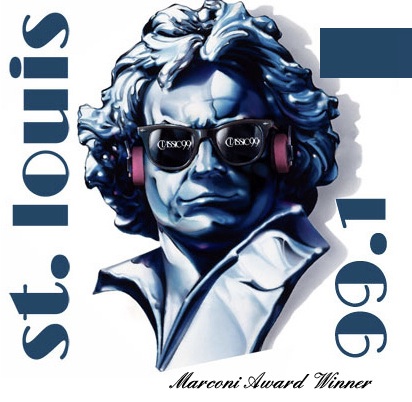 Today is the last day that KFUO-FM will broadcast classical music from the campus of Concordia Seminary. A couple of years ago this would have been only of passing interest to me, despite the fact that I can see the radio tower from my bedroom window. I chronicled that path a few months ago on this site. But now the passing of this radio station, today, fills me and all listeners of KFUO-FM with sadness.
Today is the last day that KFUO-FM will broadcast classical music from the campus of Concordia Seminary. A couple of years ago this would have been only of passing interest to me, despite the fact that I can see the radio tower from my bedroom window. I chronicled that path a few months ago on this site. But now the passing of this radio station, today, fills me and all listeners of KFUO-FM with sadness.
While we lived in Cleveland, a station that I regularly listened to switched formats. I don’t think it was sold, it was likely some kind of marketing decision. But the alternative music that I tuned in for was being dropped for, well, I don’t know what it it was dropped for — whatever was “hot” that year, no doubt. As some kind of protest, the playlist for the entire last day of broadcasting in that format consisted of a single song: REM’s “It’s the End of the World As We Know It.” Over. And Over. And Over. I kept tuning in just to see how long they would keep playing the same song (without commercial interruption). But it kept rolling and rolling and rolling, those catchy, indecipherable lyrics punctuated every four minutes by a crystal clear “Leonard Bernstein.”
I wondered what would be the last song played on KFUO. One route would be to go the “End of the World” route and play one of the great Requiem masses — Mozart or Brahms, perhaps. But that would miss the point. Yes, this is an ending. A very unfortunate ending, not only for the St. Louis community, the employees of KFUO-FM and (it seems to me) the Lutheran Church–Missouri Synod.
But the people at KFUO have chosen to not to send a bitter message. Instead, according STLToday blogger Sarah Bryan Miller, they have chosen to celebrate the music, the life and vigor that is found there. Beethoven’s Ninth Symphony — the “Ode to Joy” is apparently the choice for the last piece of classical music to be available freely over the air in St Louis.
Is this a theological issue? I think so. Not theological in the sense of a doctrine you write up, bind in a fat volume and stick on the shelf. Theological in the sense of asking basic questions, like what does the God who created me, the Son who redeems me, and the Spirit who sanctifies me want me to do with my ears? What does he want me to pass on to my kids? Does it matter that I can’t listen to KFUO-FM any more?
I think it does. In a recent book from Concordia Seminary’s Sem Press, The American Mind Meets the Mind of Christ, editor Robert Kolb highlighted an issue that I’ve wrestled with. Does being “Christian” mean that everything “non-Christian” must be avoided, or even condemned? To put it crassly, should the only thing we spend our time and money on be “church stuff”? Kolb writes, “One of the greatest challenges for contemporary North American Lutheran, as we confront more and more aspects in our own culture that seem in conflict with God’s plan for human life, is to balance our proclamation of God’s law as critical judgment and our affirmation of God’s providential goodness in the facets of our culture that reflect his goodness.”
We’ve got the “critical judgment” part down pretty well, it seems, but we don’t seem to do very well with the “affirmation of God’s providential goodness in the facets of our culture that reflect his goodness.” KFUO-FM was one place we did.
No, I don’t think the “three men I admire the most, the Father, the Son, and the Holy Ghost” will “catch the last train for the coast” simply because they can’t hear classical music in St. Louis anymore. They probably have a few CDs laying around, and access to Pandora (which works for classical music, too, I discovered, though the Shazam app does not). But there will be a hole here in the midwest. If you read this today and are in St. Louis, tune in with me before the sign-off at 10:00 pm for one last celebration. If you’re outside St. Louis, tune in over the internet on KFUO-FM’s website. And say a prayer of thanks for those who worked at KFUO-FM, the many supporters over the years, and the music with which God has blessed his creatures. Ending with the “Ode to Joy.” Somebody gets it. Thanks.

Leave a Reply
You must be logged in to post a comment.